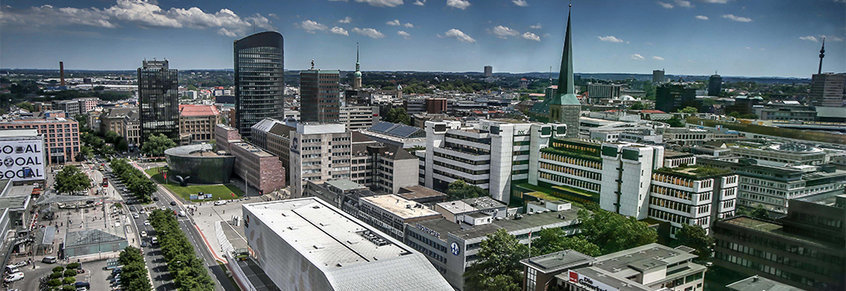
One city. Lots of knowledge
Dortmund is proud of its history and traditions, but at the same time it is a future-oriented city that is open to change and innovative approaches. It turned from a centre of cole mining and steel production to a metropolis of science and research. Biomedicine, logistics, information technology, and micro- and nanotechnology contribute to the atmosphere of the city and are the predominant fields in Dortmund’s company landscape. Today Dortmund has
- 6 universities
- 19 internationally renowned non-university research institutions
- the Technologiepark Dortmund with 8,500 employees
- 51,000 students
- 10,000 employees in the scientific institutions and universities
Today, Dortmund is one of the most dynamic cities in Germany, and is a rapidly growing technology hub. The intensive exchange between universities, research institutions, and companies as well as the highly qualified training of young professionals create an innovative climate and excellent conditions for future industries.
One result of this longstanding cooperation is the "Science Master Plan", an initiative launched in 2013 to further expand the research location of Dortmund in which the Max Planck Institute of Molecular Physiology plays a major role.
The science network in Dortmund includes
- the TU Dortmund University : In recent years, the profile area Chemical Biology has developed into a main focus of research activities. Two Max Planck directors hold chairs at the Faculty of Chemistry. Moreover, since 2013 the Federal Ministry of Education and Research has been funding the research initiative “Medical Chemistry in Dortmund”. With the grant, three research groups have been established that during a five-year period shall conduct basic research into the development of new drugs.
- the Chemical Genomics Centre (CGC), an initiative of the Max Planck Society in cooperation with Merck, AstraZeneca, Boehringer Ingelheim, Bayer HealthCare and Bayer CropScience. It stands for high quality research in the area of Chemical Genomics and strong collaborations between industry and Max Planck research.
- the Lead Discovery Center (LDC), established in 2008 by the technology transfer organization Max Planck Innovation (MI), as a novel approach to capitalize on the potential of excellent basic research for the discovery of new therapies for diseases with high medical need. The LDC seeks to advance promising research projects into the development of novel medicines in a professional manner.
- the Leibniz-Institut für Arbeitsforschung an der Technischen Universität Dortmund (IfADO), an Institute of the Leibniz Association, which focuses on questions in the fields of occupational medicine, toxicology, ergonomics and psychology in the workplace.
- the Leibniz-Institut für Analytische Wissenschaften (ISAS), a member of the Leibniz Association. It provides analytical solutions for problems in the areas of material research and life sciences. Main research topics are miniaturisation, proteomics, metabolomics, material analysis and interface spectroscopy.
- the BioMedizinZentrum (BMZ) Dortmund, where young technology companies can lease suitable space to implement their product ideas.
- The founders’ initiative tu>startup: Already today, Dortmund can look back on a multitude of company startups that have a scientific background. Since 1985 alone 510 companies have been founded at the TechnologieZentrumDortmund, of which 62% were science-based. Some 160 startups have been supported since 2002 by TU Dortmund University.
- the Fraunhofer Institute for Material Flow and Logistics, taht advises companies of all industries and sizes in all questions about material flow and logistics.
Also located in Dortmund are
- the Technologiezentrum Dortmund (TZDO), which provides technology-oriented companies and founders with an extensive infrastructure, finds international cooperation partners and advises on many company management issues.
- the Universtiy of applied Sciences and Art Dortmund with its research institutes of microsensorics, automation technology and quality assurance.
- the MST.factory Dortmund, a competence centre for micro- and nanotechnology, which offers founders and technology firms a professional technical infrastructure in the field of microsystems technology.
- the Fraunhofer-Institut für Software- und Systemtechnik (ISST): The main research topic is information logistics, i.e. it seeks solutions for individualised, demand-oriented, active flows of information.
Further cooperation partners in the region are
with their faculties of Biology and Chemistry.